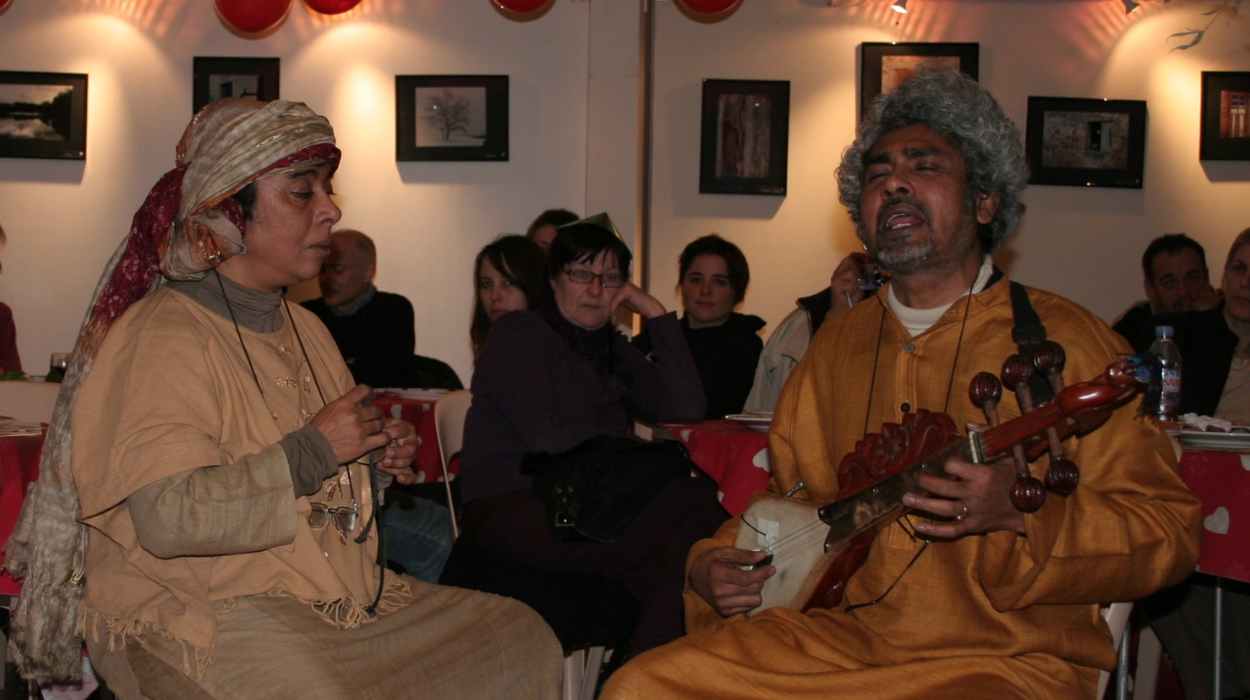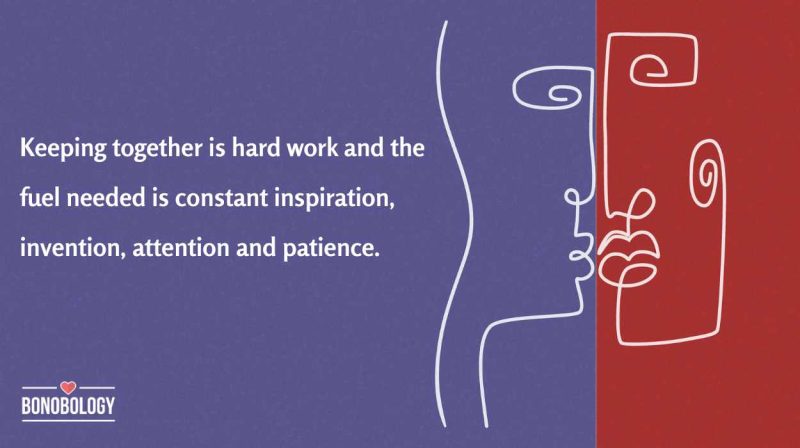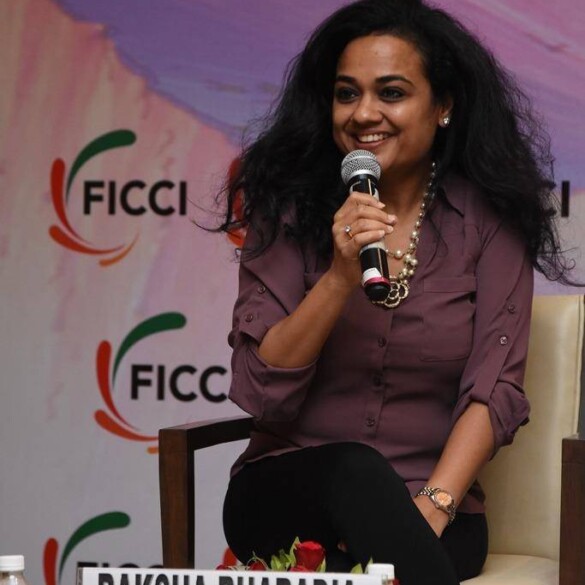In the heart of every compelling love story lies a captivating blend of contrasts, and Mimlu Sen’s journey is no exception. For over 25 years, she has shared a profound and unconventional partnership with Paban Das Baul. In an intimate interview with Raksha Bharadia for Celeb Corner, Mimlu opens up about her transformative journey from the chic streets of Paris to the serene villages of rural Bengal. Her reflections reveal the joys and challenges of being a Baul wife, where love knows no boundaries and every day is a discovery. Mimlu’s story is a vivid testament to the enduring power of love, seamlessly blending diverse worlds, cultures, and philosophies, and offering a unique perspective on modern relationships. Join us as we explore the duality of love through the eyes of Mimlu Sen and her remarkable journey with Paban Das Baul. Mimlu Sen has been in a productive partnership with Paban Das Baul for 25 years. Here are a few reflections:
How difficult or easy was it for you to decide to move from Paris to the rural Bengali hinterland with both your children after you met Paban and decided to be partners?
Table of Contents
My children are French, born in France. I knew that I had to create a little nest for them where they could grow up with access to their French culture. Therefore, I chose to live in Shantiniketan, where the atmosphere is still creative and cosmopolitan today, despite the degeneration of university life. It was even more so then. It was difficult for the children to adjust to village life, but since we had a home base of our own, I think they enjoyed themselves thoroughly. The love we all received from Paban and the Bauls, in general, had a lot to do with our being able to balance between both worlds. I had to make sure we lived in a healthy sanitary environment with regular meals and hours of work, play, and rest. We went on long walks together, sometimes on expeditions to the villages that lasted two or three days. I always made sure to carry a stock of water. They are both great parents now, and we still spend a lot of time together, all three generations. Both Krishna and Duniya have two children each, and they travel a lot with their children, even back to the Bengali villages, so they have kept up the tradition.
Apart from Paban’s voice and passion for singing, what was it that attracted you to him and made you decide to choose a completely different life than you had been leading?
His kindness and humanity. His unqualified adoration of women and women’s power.
All humans have their doppelgangers, their good or evil twin, residing within themselves. The recognition of this duality is what Baul philosophy is all about.

So, it’s not only Paban’s voice and his beauty that attracted me (I feel that he has definitely one of the most beautiful voices on earth) but also the content of Baul songs, which are a constant reminder that life itself is transient and that the love between a man and a woman can become a discovery of the self—the physical, psychical, and spiritual self.
You said in an interview once about Paban that “He is a Baul and belongs to everybody. You can never say he is my husband and only belongs to me. I have never had that approach with him.” It is very rare to hear a partner say this these days. How do you see modern Indian relationships today? Do you think we chain the other down looking for exclusivity?
I would qualify this by saying that Paban is, above all, an artist in every sense of the word. I believe in the total freedom and autonomy of the artist. He is the king and creator of his own universe.
I really would not generalize and say that what is true for Paban is true for all Indian relationships. Society in India is still very traditional, and although this has its strong points, the great weakness is that it forces Indians to lead double lives. This is true from the very top of society to the very bottom.

Both of you travel the world and have taken Baul as far as Mexico. You have been together for over 25 years. How do you think your relationship has changed or grown over the years?
Yes, relationships change, grow mature, or dwindle away. Certain aspects of our relationship have dwindled and as we grow older we’re chipped to each other like most old Indian grandparents.
We’re partners as artists and have embarked on a cultural and artistic journey over the past 30 years of our collaboration. Over these years, we’ve learned a great deal from each other and are still learning today. This journey between India and the world is what has shaped our lives.
I’m writing new stories about these journeys, and Paban is writing new songs. Our partnership has led to many interesting collaborations, and we hope to do a few more before we say goodbye to this wonderful earth.

Related Reading: How Our Relationship And Marriage Has Evolved Over Time
What advice would you have for young lovers in modern India today on companionship and commitment?
It takes a lifetime to know your own body, so knowing another will take another lifetime.
Keeping together is hard work, and the fuel needed is constant inspiration, invention, attention, and patience.
| My son Krishna has been living alone for years now, as is usual among young Parisians. I’ve had several conversations with him about this. It’s not that I want a daughter-in-law. I’m an independent old granny who enjoys every minute of my liberty. It’s just that we all need a friend by our side, someone who will pick you up when you fall down. A life companion must first, and above all else, be your friend. For the last seven years, he’s been on his own, except for one weekend every two weeks and half the summer holidays, when his two delicious children, Aniya and Iskandar, come to stay with him. So, when he asked me at lunch yesterday why I felt it was necessary to live as a couple, I answered that living as a couple is like a wrestling match that goes on until the very last breath. It keeps you in form. It’s a very dynamic way of engaging with life through a crossfire that will always be a source of energy. But living alone, I said, can make you oversensitive or just not sensitive enough. |
Final Thought
The duality of love, as Mimlu Sen beautifully portrays, reminds us that love is as much about embracing contrasts as it is about unity. It thrives in the tension between passion and peace, individuality and togetherness, joy and challenges. Through her insights, we are reminded that true love isn’t perfect—it’s profound, evolving, and deeply human. May her words inspire us to cherish love’s complexities and celebrate its enduring power to connect and transform
Your contribution does not constitute a charitable donation. It will allow Bonobology to continue bringing you new and up-to-date information in our pursuit of helping anyone in the world to learn how to do anything.



Featured
7 Shows & Movies About Sex Workers That Leave A Mark
No Capes In Sight: The Movies That Change The Way We Look At Male Heroes
5 Celebrity Couples Known For Their Philanthropic Work
10 Best Dialogues Of Ayushmann Khurrana That You MUST Know
The Best Dialogues Delivered By Ranveer Singh From His Movies
These Top Heroines Prove Age Is Just A Number In Bollywood
Running Away Together: Parimala Jaggesh
Facts About The Marriage of Abhijit Banerjee And Esther Duflo
Marathi Actor Subodh Bhave: I Fell in Love with a Girl Back in School and Married Her
11 Best Dialogues on Love by Shraddha Kapoor
6 Bollywood Heroines Who Played Villain Roles Amazingly Well!
New Beginnings: Anu Prabhakar Mukherjee’s Interview
Ramesh Aravind: Archana Is the Anchor of My Home
10 Famous Celebrity Same Sex (Gay) Couples
10 Best Dialogues From Rajkummar Rao’s Movies
Why these are the 5 Most Misogynistic Songs of Bollywood
Controversial Author Salman Rushdie and all about the Women He Loved
10 Best Dialogues From Nawazuddin Siddiqui’s Movies
The Sexist Dialogues in Bollywood Films
Monogamy was meant for the housewife, not the apsara – Devdutt Pattanaik